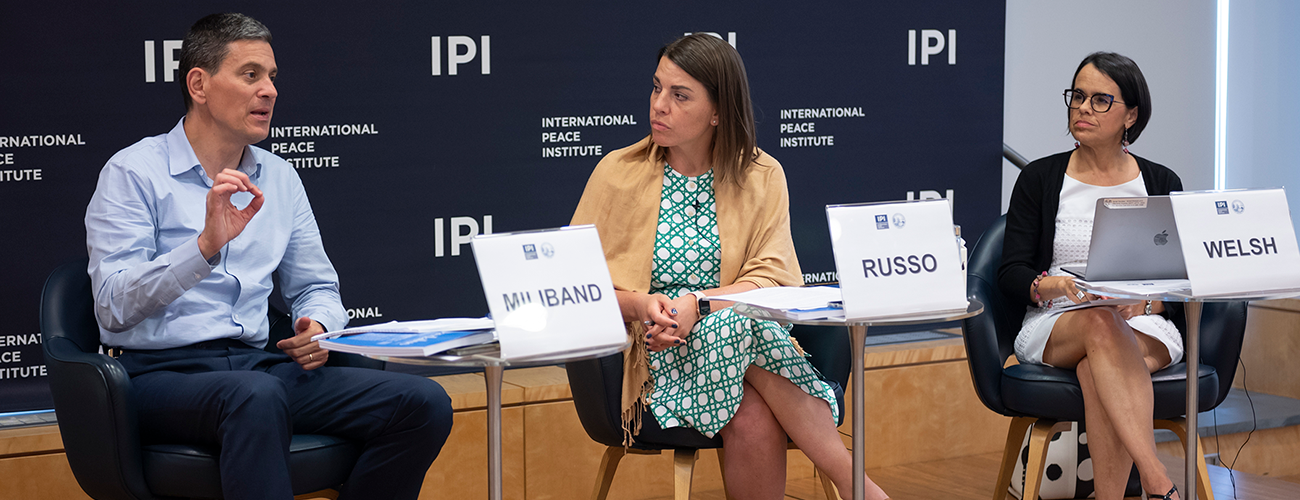During an event cohosted by IPI and the American Academy of Arts and Sciences on July 20th, panelists discussed the challenging global context for delivering humanitarian health responses, as well as specific issues such as the need to address gender-based violence in humanitarian health responses, the imperative to localize humanitarian action, and the opportunities and risks at the intersection of health, development, and peace.
The Secretary General’s New Agenda for Peace notes “conflict and disease can intersect in multiple ways and the risk posed are currently not addressed holistically and in a coordinated manner.” The discussion, which featured participants from a range of backgrounds, contributed to an enhanced systematic understanding of these constraints.
In May 2023, in partnership with MIT Press, the American Academy of Arts and Sciences released a special issue of the journal Daedalus, “Delivering Humanitarian Health Services in Violent Conflicts,” as part of the Academy’s project on Rethinking the Humanitarian Health Response to Violent Conflict. As the launch of this special issue, the policy forum brought together academics, scholars, policymakers, and practitioners to discuss the contemporary challenges and opportunities in humanitarian health delivery.
President of the International Rescue Committee, David Miliband set the scene by highlighting two major trends in global politics. The first trend is the “growing global risks in a hyper-connected world,” and secondly, political/geopolitical fragmentation, a trend which exacerbates those risks.
Addressing the health needs of people on the move requires rethinking the fluidity of health systems and the importance to expand the paradigm of the current health system and framework. Fouad Fouad, Associate Professor of Public Health Practice at the American University of Beirut suggested a potential “health system beyond borders,” which could foster a more integrated response. International health NGOs could be uniquely well positioned to operationalize commitments to localize humanitarian health delivery and better support actors in leadership roles, noted Jennifer Welsh, Canada 150 Research Chair in Global Governance and Security at McGill University. However, there is a lack of data to assess how localization could work in the humanitarian health sector and a need for more public opinion research on local populations. Welsh reminded participants that there are preexisting tools that could be enhanced.
IPI non-resident fellow Dirk Druet expressed that “given the realities of where health emergencies are likely to take place in the future, adopting emergency humanitarian responses to operating in conflict situations is absolutely critical to helping the most vulnerable.” In the realm of emergency health situations, the international community lacks clarity on the practical implications of adopting a conflict-informed approach.
Daedalus is the Academy’s open-access quarterly journal, featuring multidisciplinary, authoritative essays centered on a theme or subject and drawing on the intellectual capacity of Academy members and outside experts. Please visit here to see the May 2023 issue.
Welcoming/Opening Remarks:
Adam Lupel
David Oxtoby, President, American Academy of Arts and Sciences
Panelists:
David Miliband, President, International Rescue Committee
Jennifer Welsh, Canada 150 Research Chair in Global Governance and Security, McGill University; Project Cochair, Rethinking the Humanitarian Health Response to Violent Conflict
Fouad Fouad, Associate Professor of Public Health Practice, American University of Beirut (virtual)
Dirk Druet, Affiliate Researcher, McGill University; Non-Resident Fellow, International Peace Institute (virtual)
Moderator:
Jenna Russo, Director of Research and Head of the Brian Urquhart Center for Peace Operations, International Peace Institute
Closing Remarks:
Paul Wise, Richard E. Behrman Professor of Child Health and Society, Stanford University; Project Cochair, Rethinking the Humanitarian Health Response to Violent Conflict








